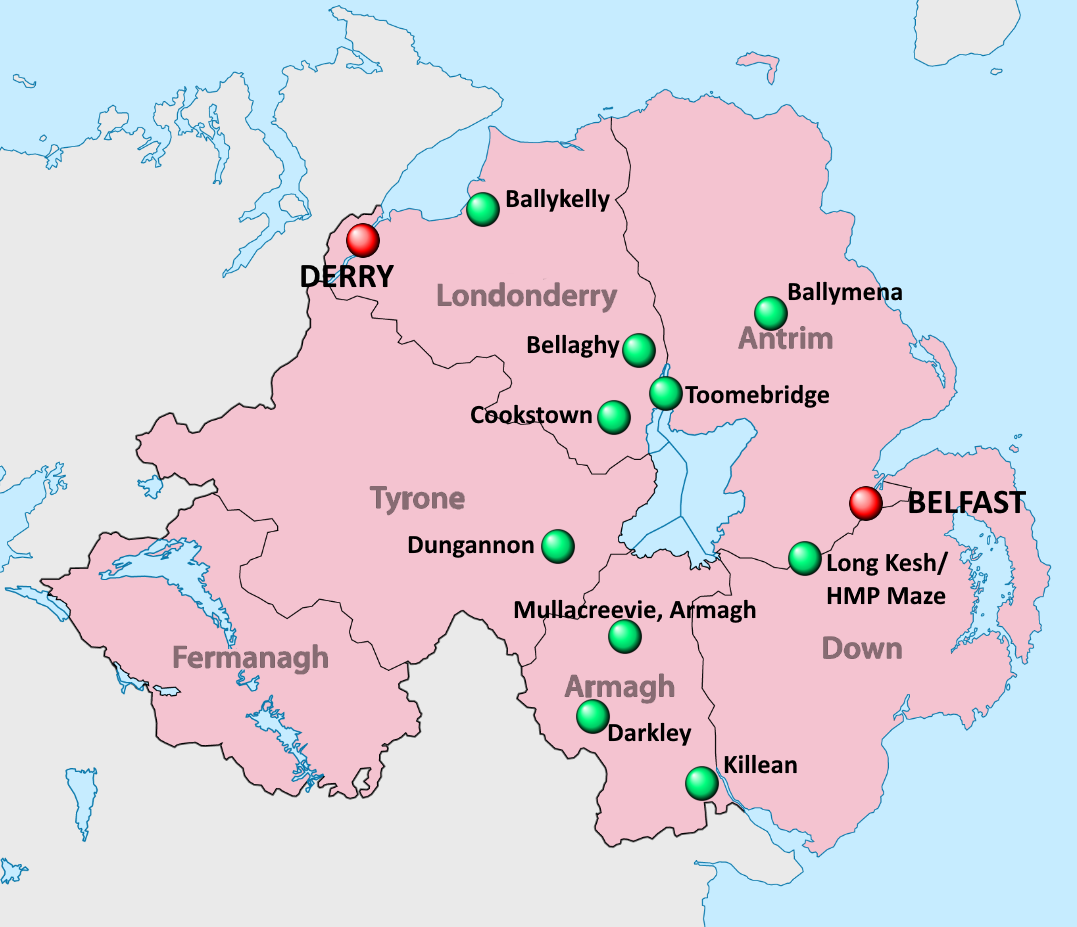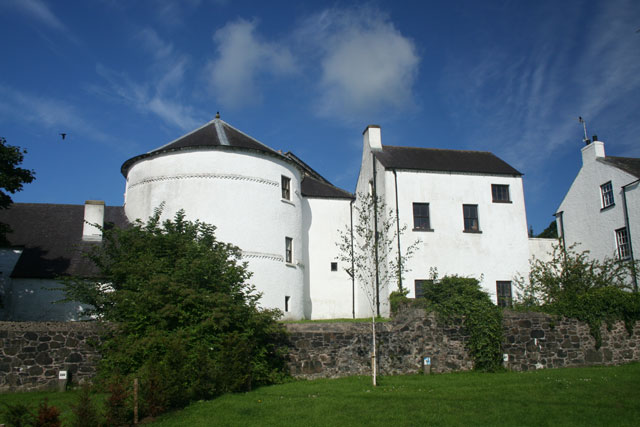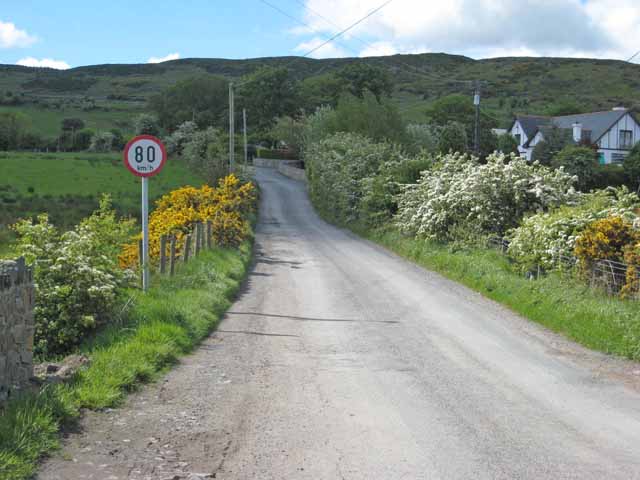|
Dominic McGlinchey
Dominic "Mad Dog" McGlinchey (1954 – 10 February 1994) was an Irish republican paramilitary leader, who moved from the Provisional IRA to become head of the Irish National Liberation Army (INLA) paramilitary group in the early 1980s. McGlinchey was one of 11 siblings born into a staunchly republican family from Bellaghy, County Londonderry. In 1971 he was interned without charge for ten months in Long Kesh; not long after his release the following year, he was imprisoned again on arms charges. During his imprisonment, he married his wife Mary in 1975. Together they had three children. After his release, McGlinchey joined Ian Milne and future Provisional IRA hunger strikers Francis Hughes and Thomas McElwee, and waged a campaign of shooting and bombing throughout the county and beyond. Together, they later joined the Provisional IRA. The gang spent the late 1970s on the run, carrying out operations and evading both the British Army and the Garda Síochána. The latter force ar ... [...More Info...] [...Related Items...] OR: [Wikipedia] [Google] [Baidu] |
Bellaghy
Bellaghy () is a village in County Derry, Northern Ireland. It lies north west of Lough Neagh and about 5 miles north east of Magherafelt. In the centre of the village (known locally as The Diamond) three main roads lead to Magherafelt, Portglenone and Toome. It had a population of 1,063 people in the 2001 Census and is within Mid-Ulster District. Bellaghy is home to a well-preserved 17th century fortified house, Bellaghy Bawn, which is now a museum. It is also known as the birthplace, childhood home and resting place of poet Seamus Heaney (1939–2013), who won the Nobel Prize for Literature. There is an arts centre in the village dedicated to Heaney.Roslyn Sulcas, "Ireland Celebrates the Life and Legacy of Nobel Prize-Winning Poet", ''New York Times,'' 17 October 2016 History There had long been Gaelic settlements in this area. Archaeological evidence has been found in the village of a Gaelic ringfort. In the early 17th century, Bellaghy became one of many towns p ... [...More Info...] [...Related Items...] OR: [Wikipedia] [Google] [Baidu] |
1981 Irish Hunger Strike
The 1981 Irish hunger strike was the culmination of a five-year protest during the Troubles by Irish republican prisoners in Northern Ireland. The protest began as the blanket protest in 1976, when the British government withdrew Special Category Status (prisoner of war rather than criminal status) for convicted paramilitary prisoners. In 1978, the dispute escalated into the dirty protest, where prisoners refused to leave their cells to wash and covered the walls of their cells with excrement. In 1980, seven prisoners participated in the first hunger strike, which ended after 53 days. The second hunger strike took place in 1981 and was a showdown between the prisoners and the Prime Minister, Margaret Thatcher. One hunger striker, Bobby Sands, was elected as a member of parliament during the strike, prompting media interest from around the world. The strike was called off after ten prisoners had starved themselves to death, including Sands, whose funeral was attended ... [...More Info...] [...Related Items...] OR: [Wikipedia] [Google] [Baidu] |
South Armagh Brigade
The South Armagh Brigade of the Provisional Irish Republican Army (IRA) operated during the Troubles in south County Armagh. It was organised into two battalions, one around Jonesborough and another around Crossmaglen. By the 1990s, the South Armagh Brigade was thought to consist of about 40 members, roughly half of them living south of the border. It has allegedly been commanded since the 1970s by Thomas 'Slab' Murphy who is also alleged to be a member of the IRA's Army Council. Compared to other brigades, the South Armagh IRA was seen as an 'independent republic' within the republican movement, retaining a battalion organizational structure and not adopting the cell structure the rest of the IRA was forced to adopt after repeated intelligence failures. As well as paramilitary activity, the South Armagh Brigade has also been widely accused of smuggling across the Irish border. Between 1970 and 1997 the brigade was responsible for the deaths of 165 members of British security ... [...More Info...] [...Related Items...] OR: [Wikipedia] [Google] [Baidu] |
Sunday Tribune
The ''Sunday Tribune'' was an Irish Sunday broadsheet newspaper published by Tribune Newspapers plc. It was edited in its final years by Nóirín Hegarty, who changed both the tone and the physical format of the newspaper from broadsheet to tabloid. Previous editors were Conor Brady, Vincent Browne, Peter Murtagh, Matt Cooper and Paddy Murray. The ''Sunday Tribune'' was founded in 1980, closed in 1982, relaunched in 1983 and entered receivership in February 2011 after which it ceased to trade. Foundation, collapse and first relaunch The newspaper was founded in 1980 by John Mulcahy as a tabloid with Conor Brady (later editor of ''The Irish Times'') as its first editor. The format changed to broadsheet with the addition of a colour supplement magazine after the first year. It was moderately successful but its growing financial stability (it had not yet made a profit but was moving in that direction) was undermined when its then owner, Hugh McLaughlin, launched the financia ... [...More Info...] [...Related Items...] OR: [Wikipedia] [Google] [Baidu] |
Darkley Killings
The Darkley killings or Darkley massacre was a gun attack carried out on 20 November 1983 near the village of Darkley in County Armagh, Northern Ireland. Three gunmen attacked worshippers attending a church service at Mountain Lodge Pentecostal Church, killing three Protestant civilians and wounding seven. The attackers were rogue members of the Irish National Liberation Army (INLA). They claimed responsibility using the cover name "Catholic Reaction Force", saying it was retaliation for recent sectarian attacks on Catholics by the loyalist " Protestant Action Force". The attack was condemned by INLA leadership. Background In the months before the Darkley killings, several Catholic civilians were killed by loyalists. On 29 October 1983, a Catholic civilian member of the Workers' Party, David Nocher (26), was shot dead in Belfast. On 8 November, Catholic civilian Adrian Carroll (24) was shot dead in Armagh, UDR personnel were later convicted but the convictions were cleared ... [...More Info...] [...Related Items...] OR: [Wikipedia] [Google] [Baidu] |
Informer
An informant (also called an informer or, as a slang term, a “snitch”) is a person who provides privileged information about a person or organization to an agency. The term is usually used within the law-enforcement world, where informants are officially known as confidential human sources (CHS), or criminal informants (CI). It can also refer pejoratively to someone who supplies information without the consent of the involved parties."The Weakest Link: The Dire Consequences of a Weak Link in the Informant Handling and Covert Operations Chain-of-Command" by M Levine. ''Law Enforcement Executive Forum'', 2009 The term is commonly used in politics, industry, entertainment, and academia. In the United States, a confidential informant or "CI" is "any individual who provides useful and credible information to a law enforcement agency regarding felonious criminal activities and from whom the agency expects or intends to obtain additional useful and credible information regardin ... [...More Info...] [...Related Items...] OR: [Wikipedia] [Google] [Baidu] |
Droppin Well Bombing
The Droppin Well bombing or Ballykelly bombing occurred on 6 December 1982, when the Irish National Liberation Army (INLA) detonated a time bomb at a disco in Ballykelly, County Londonderry, Northern Ireland. The disco, known as the Droppin Well, was targeted because it was frequented by British Army soldiers from nearby Shackleton Barracks. The bomb killed 17 people: eleven soldiers and six civilians, while dozens more were wounded. It was the deadliest attack during the INLA's paramilitary campaign and one of the deadliest bombings of The Troubles. Attack The bomb was made by the INLA in nearby Derry. One of those involved later revealed that the INLA unit had carried out reconnaissance missions to the Droppin Well to see if there were enough soldiers to justify the likelihood of civilian casualties. On the evening of 6 December 1982, an INLA member left a bomb inside the pub. There were about 150 people inside. [...More Info...] [...Related Items...] OR: [Wikipedia] [Google] [Baidu] |
Republic Of Ireland–United Kingdom Border
The Republic of Ireland–United Kingdom border, sometimes referred to as the Irish border or British–Irish border, runs for Ordnance Survey of Northern Ireland, 1999MFPP Working Paper No. 2, "The Creation and Consolidation of the Irish Border" (PDF) by KJ Rankin and published in association with Institute for British-Irish Studies, University College Dublin and Institute for Governance, Queen's University, Belfast (also printed as IBIS working paper no. 48) from Lough Foyle in the north-west of |
Chief Of Staff
The title chief of staff (or head of staff) identifies the leader of a complex organization such as the armed forces, institution, or body of persons and it also may identify a principal staff officer (PSO), who is the coordinator of the supporting staff or a primary aide-de-camp to an important individual, such as a president, or a senior military officer, or leader of a large organization. In general, a chief of staff provides a buffer between a chief executive and that executive's direct-reporting team. The chief of staff generally works behind the scenes to solve problems, mediate disputes, and deal with issues before they are brought to the chief executive. Often chiefs of staff act as a confidant and advisor to the chief executive, acting as a sounding board for ideas. Ultimately the actual duties depend on the position and the people involved. Civilian Government Brazil *Chief of Staff of the Presidency Canada * Chief of Staff to the Prime Minister *Principal Secr ... [...More Info...] [...Related Items...] OR: [Wikipedia] [Google] [Baidu] |
Portlaoise Prison
Portlaoise Prison ( ga, Príosún Phort Laoise) is a maximum security prison in Portlaoise, County Laois, Ireland. Until 1929 it was called the Maryborough Gaol. It should not be confused with the Midlands Prison, which is a newer, medium security prison directly beside it; or with Dunamaise Arts Centre, which was the original Maryborough Gaol built . Portlaoise Prison was built in the 1830s, making it one of the oldest still operating today in the Irish prison system. It is the prison in which people convicted of membership of the Provisional Irish Republican Army (IRA) and other illegal paramilitary and designated terrorist organisations are usually detained. A number of IRA and dissident republican prisoners are housed in "E Block". Anyone charged under Section 30 of the Offences Against the State Act must be sent to the prison because of its unique security measures. Soldiers from the Irish Army patrol Portlaoise Prison on a permanent basis. Security Soldiers guard th ... [...More Info...] [...Related Items...] OR: [Wikipedia] [Google] [Baidu] |
Carjacking
Carjacking is a robbery in which the item taken over is a motor vehicle.Michael Cherbonneau, "Carjacking," in ''Encyclopedia of Social Problems'', Vol. 1 (SAGE, 2008: ed. Vincent N. Parrillo), pp. 110-11. In contrast to car theft, carjacking is usually in the presence and knowledge of the victim. A common crime in many places in the world, carjacking has been the subject of legislative responses, criminology studies, and prevention efforts. Commercial vehicles such as trucks and armored cars containing valuable cargo are common targets of carjacking attempts. Carjacking usually involves physical violence to the victim, or using the victim as a hostage. In rare cases, carjacking may also involve sexual assault. Etymology The word is a portmanteau of '' car'' and ''hijacking''. The term was coined by reporter Scott Bowles and editor EJ Mitchell with ''The Detroit News'' in 1991. ''The News'' first used the term in a report on the murder of Ruth Wahl, a 22-year-old Detroit drugstor ... [...More Info...] [...Related Items...] OR: [Wikipedia] [Google] [Baidu] |
Garda Síochána
(; meaning "the Guardian(s) of the Peace"), more commonly referred to as the Gardaí (; "Guardians") or "the Guards", is the national police service of Ireland. The service is headed by the Garda Commissioner who is appointed by the Irish Government. Its headquarters are in Dublin's Phoenix Park. Since the formation of the in 1923, it has been a predominantly unarmed force, and more than three-quarters of the force do not routinely carry firearms. As of 31 December 2019, the police service had 14,708 sworn members (including 458 sworn Reserve members) and 2,944 civilian staff. Operationally, the is organised into four geographical regions: the East, North/West, South and Dublin Metropolitan regions. The force is the main law enforcement agency in the state, acting at local and national levels. Its roles include crime detection and prevention, drug enforcement, road traffic enforcement and accident investigation, diplomatic and witness protection responsibilities. It also pr ... [...More Info...] [...Related Items...] OR: [Wikipedia] [Google] [Baidu] |




.jpg)